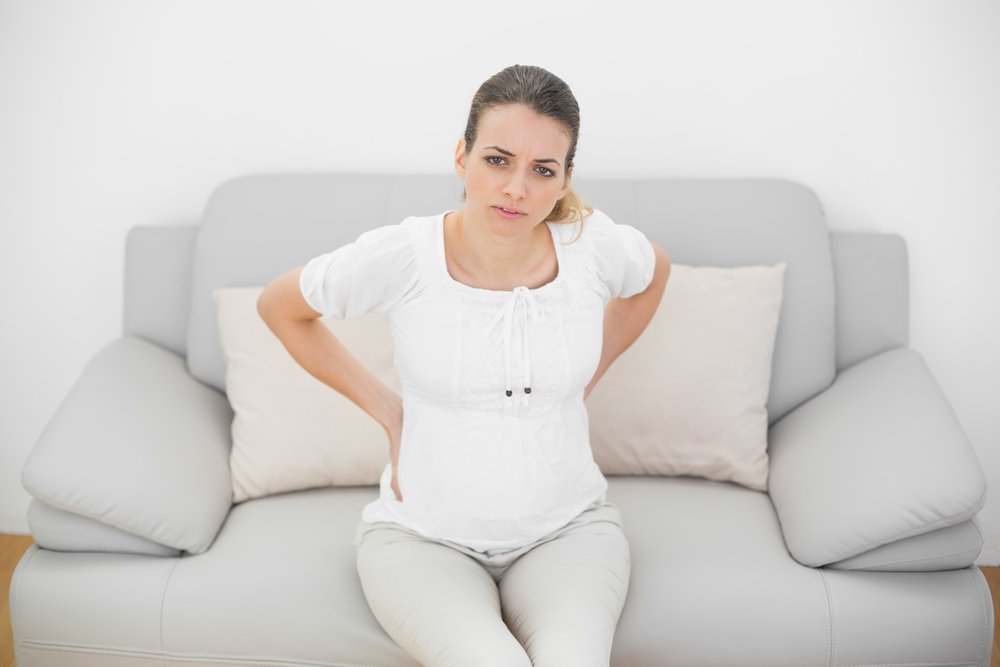A hernia is a condition in which you develop a hole in the muscular layer of your abdominal wall that allows fatty or intestinal tissue to protrude. Many women develop hernia during pregnancy. It happens due to increased pressure in the abdominal region caused by the growing baby in your uterus. You do not always have to worry about this condition, but you may need to seek treatment after delivery to avoid any further complications.
2 Most Common Types of Hernia During Pregnancy

Umbilical Hernia
The word "umbilical" does not indicate this type of hernia has something to do with your baby. It gets this name because it occurs at your belly button where you had your own umbilical cord. There is normally a small opening at this point but increased pressure can stretch it. You will experience tenderness with pain at your belly button. Usually, the size of the opening will return to normal and the pain will go away on its own. But this condition tends to last longer when it comes to pregnant women because of constant pressure. Fortunately, umbilical hernia is unlikely to cause you much discomfort but only slight inconvenience.
Inguinal Hernia
It occurs when tissue tears through a spot in your groin muscle. It is more likely to happen during pregnancy because the growing baby puts extra pressure on the groin area, and with a weakened abdominal muscle wall, hernia may occur. The most common symptom is a bulge in the scrotum or groin. The bulge develops over a period of several weeks and may start to hurt or burn. It can also occur out of nowhere when you lift heavy weights, strain, bend, cough, or laugh.
How Is Hernia During Pregnancy Treated?
The only effective treatment for an enlarged and painful hernia is surgery while small ones can wait. It is important to repair the wall of the muscle to treat this condition. You should, however, avoid having a surgery during pregnancy unless it is causing severe pain or seems harmful to your baby. The best thing is to delay it until you give birth to your baby and recover. In most cases, you should wait at least 3-6 months after delivery to undergo a surgery for hernia. If hernia during pregnancyis causing serious trouble, you may want to go for a surgery during the second trimester.
After your baby is born and you are fully recovered, it is time to talk to your doctor about having surgical treatment for hernia. Just bear in mind that hernias should not be left untreated once diagnosed, but special caution is warranted if you have an existing hernia and is considering to start another pregnancy.
Pain Relief for Hernia During Pregnancy
Hernias can be painful, but the pain is usually manageable for most women during pregnancy. If you experience pain, you can try using a hernia support band that keeps the hernia from becoming larger. With its help, it’s usually possible to go through your pregnancy without having to go for a surgery.
At the same time, it is important that you avoid lifting until delivery. Do not carry heavy groceries bags or boxes. Instead, ask your partner to do it for you or invest in a shopping cart to wheel the stuff.
You should also take plenty of rest. Lying down will help take the pressure off your abdomen and relieve pain. You may also keep a pillow between your knees for support.
Will Hernia During Pregnancy Cause Any Complications?
Some women experience no symptoms whatsoever when they have this condition, while others find it quite painful and difficult to manage. It is also possible to experience less pain in the later stages of your pregnancy because the growing size of your baby actually blocks the hole in the abdominal wall.
The good thing is that you usually do not need a Caesarean section when you are dealing with a hernia during pregnancy. In most cases, women with hernia can still deliver the baby vaginally, and your healthcare providers will help you through delivery to make sure that no complications will occur.
What Is It Like to Have Hernia During Pregnancy?
I developed hernia when I was pregnant with my first son – he is 3 years old now. It was above my belly button and put me in a lot of misery. I had to go to the ER for at least third time a week to get help pushing my hernia back in. Not only was it painful, it was quite consistent too. My doctor was also worried and she talked to thesurgeon about performing a surgery. I had that surgery done when I was about 5 month along and it was a relief. My surgeon later informed me that it was so painful because I had about 5-6 hernias all close together. Thankfully, it did not affect my baby.
My doctor informed me yesterday that I have a hernia. I could not notice it myself since it is not bulging. It is behind my belly button and pains a lot when I cough or sneeze. My doctor has told me to stay away from abdominal exercises with strictly no heavy lifting. He believes it will go away once I deliver my baby. The pain is quite manageable but I also have constipation that makes me worry a little because straining hard could cause the hernia to flare up.
